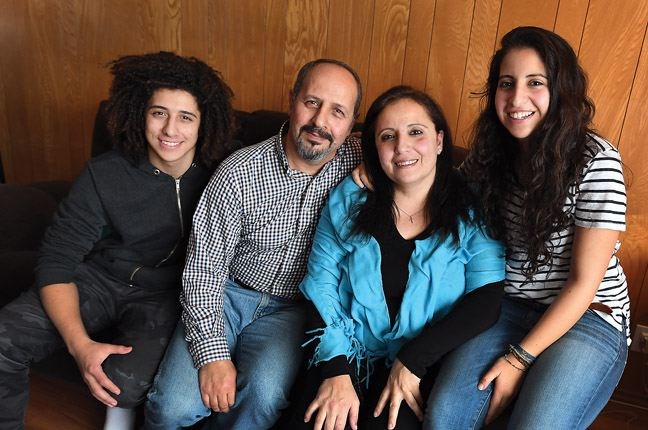Artifacts from the Tohme family's last handful of years are spread sparsely throughout their new home. Shells representing each of the four years spent in Lebanon, a photo of the far-off son and a framed lace tablecloth - one of the few remnants of a life before Canada.
At the entrance, a white wall holds four slabs with etched invocations surrounding a cross: faith, believe, hope, dream. The words are more than reminders of their religion. In those four words, there is a journey.
Rose Tohme was still in Lebanon with her husband and four children when an American girl handed her a key with 'hope' carved into the metal. Rose says it sparked something in her. Even though they had spent four long years in limbo, it seemed a home wasn't so far-off.
"My hope came back," she says. For a long time, it was simple faith driving the belief they would make it out of Lebanon, as they had made it out of their coastal home in Syria.
"We have settled in a safe place," says Rose from her Prince George living room, pointing to the last of those art tiles. "This, our dream has been fulfilled."
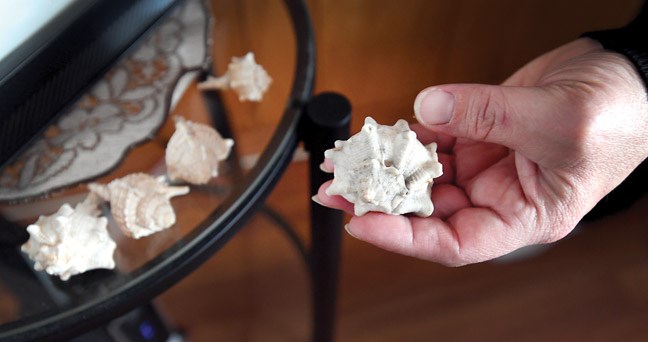
Since The Citizen spoke with Rose and Nael just weeks after the couple's January arrival, much has changed.
From that first apartment, furnished by their Westwood Church sponsors, they've moved to a house. They have a car and their driver's licences and the freedom to shop and work and attend doctor's appointments without relying on the generosity of volunteers to get them there. They've taken on similarly supportive roles with the six other Syrian families in Prince George who came in the weeks and months after the Tohmes - Prince George's first Syrian refugee family.
By March, Rose was working with the Immigrant and Multicultural Services Society as a settlement worker assistant, while also helping teach English. It's what Rose did before. Nael, who is still grasping English, has found work at Pioneer Parts Rebuilding Ltd. helping fix hydraulic pumps. He used to be a civil engineer assistant.
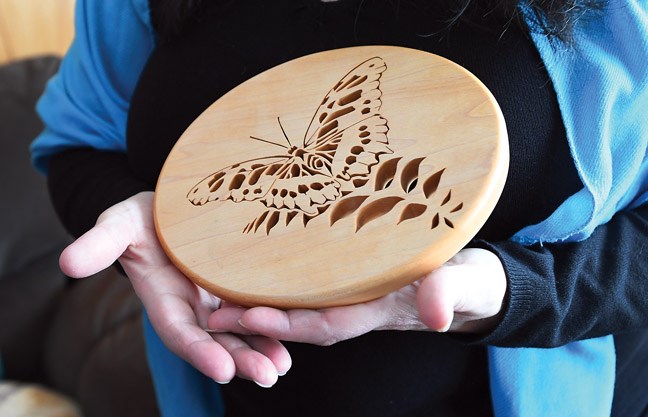
Samuel, 21, moved to Abbotsford in September to study worship and art at Columbia Bible College and 17-year-old Barnabus, who plays piano, guitar and drums, is in his final year at Cedars Christian School and hopes to pursue music.
Sara, 25, has a different story. Like many young educated Syrian immigrants, her schooling remains a question. She was in her final semester, eight subjects away from graduation in Syria and almost a year later still doesn't know what credits the University of Northern B.C. will accept. UNBC offered free tuition for her first year, something Sara appreciates. But she still feels like she's taking random courses while her future waits.
"It's like I just finished high school and I need to decide again," says Sara, who was studying English literature in Syria. Her situation is so different from other students she meets on campus. "They all know what they're going to do but for me I have no idea because this is all new for me."
She's found purpose in other ways. Focus Club has been a way to connect with international students and she's done whatever she can to help other Syrians settle in Canada. Two UNBC students came to Prince George as refugees over the summer, alone and far from their families and like her with a partial degree they couldn't use.
After three families moved to a small Manitoba town of 8,000 people, Sara spent the summer in Dauphin translating and helping them adjust to a new life.
"I think the biggest challenge for me... it's not language, it's not culture," says Sara, who is back in Manitoba for Christmas. "The biggest for me is this feeling of guilt that I feel sometimes of just being here and having a nice life.
"People in Syria are still suffering. I said I can't go to Syria to help people so I would love to help here," she says, and being in Dauphin assuaged that guilt. "(Helping) was also good for my spirit too, because that's what my heart wants."
Like daughter, like mother.
Rose spends her time with the other Syrian families, where she can make a difference.
"I can look in any one of their eyes and see how they're doing so it's not just teaching them English or the culture or helping them to fit here or to help them to be settled here. It's like, because I am the same as them. I have the same feeling, I can help them through this."
They call her Mum Rose or Mama, and her voice lifts as she speaks the title.
"This is really touch my heart and I feel very responsible for them. Even after I finish my work, we go as a family and visit the Syrians, check about how they are doing, any kind of help they need.
"It's not a job, it's a life that gives me joy. This is my joy now, here."
The family's experience has been unique from the 38,000 Syrian refugees who came to Canada by mid-December. The Tohmes came equipped with a good grasp of English when they landed and they now have jobs, though Rose is quick to note how easy it is for circumstances to change.
Helping with classes at the IMSS office on Second Avenue, she's seen progress. Now Syrian students can greet each other and ask questions in the new language.
"When they arrived, no English at all. Even letters," she says.
About a third of Canada's Syrians were privately sponsored like the Tohmes, but the numbers are much smaller in B.C. Only 15 per cent of the 2,850 Syrians that came to B.C. arrived that way, according to the Immigrant Services Society of B.C.'s latest data from August.
The organization interviewed some of the province's 2,100 government-assisted refugees and found 76 per cent are enrolled in language classes. The majority have lower language levels, the report says, adding almost one year after arrival, 81 per cent self-assessed as having no or beginner-level English.
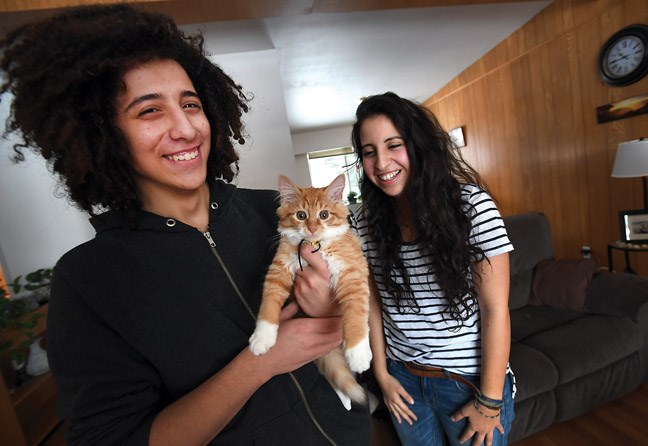
"Even if you know English, it's a totally new, different transition," adds Rose. "But also because of the love of people here in Prince George, they're willing to help. They're welcoming. It was much more easier for us."
When the Westwood Church made plans to support two Syrian families, they called it a multi-year commitment. But Rose says in Prince George that built-in support also comes at the community level. That means the four government-sponsored families, who after one year will lose the monthly living allowance and either support themselves or turn to provincial assistance, are better supported here compared to bigger cities.
The Immigrant Services Society of B.C.'s survey found two-thirds regularly use the food bank, a similar finding to the experiences of other low-income British Columbians.
Rose doesn't bring up hardship when she speaks of her last year. In an hour-long conversation, the family uses the word grateful 12 times. Rose mentions the prime minister, local MLAs, the mayor all by name, thanking them, UNBC, the volunteers, churches, the mosque, IMSS and more.
"They really care about the Syrians. They always check how they are doing," she says.
When her eldest son got married in April, and the Skype connection to Dubai was too spotty, friends from Westwood Church were there for the family. That day, Rose remembers crying and accepting an invitation from church friends for tea. When they arrived, one-by-one friends brought gifts, so the family experienced John and Kenar's celebration even at a distance.
"It really touched our hearts," says Rose, eyes brimming as she holds a black-and-white frame of the son she hasn't seen in four years. On the wall, behind her, the last photo of the six together taken in Lebanon.
The 28-year-old was too old to come with the family and always asks for help to come to Canada. They're trying.
"Good things happening, but still waiting," says Rose, like so many families separated by the war. "I can't forget this. My heart."
She likens their new life to a beautiful, precious puzzle.
"Whenever you look at this puzzle and you see that there is a piece missing in the heart of it - in the middle of it - you will always look, it is so precious, so beautiful, but I wish if this piece was there. So this is what we feel."
They try to live positively and in hope that they will see John again.
"I hope that this day will come and there will be reunited families. And also that Syria will come back and be healed from this war, awful war."
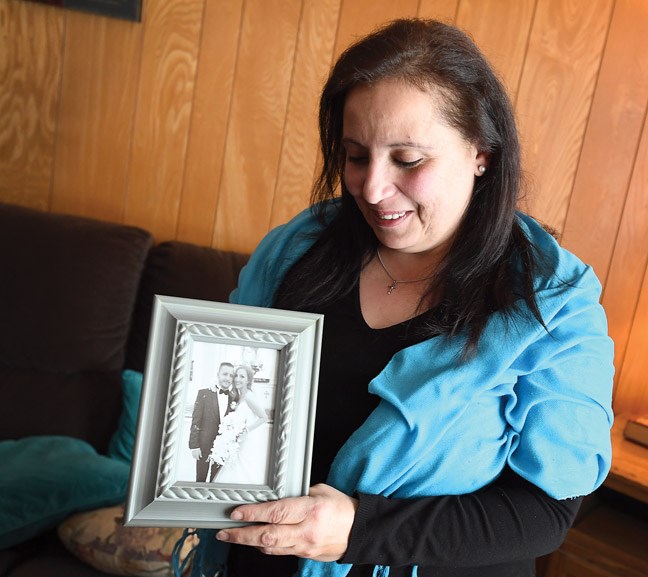
Some might call it luck or coincidence or connection that brought the Tohmes to Canada. Rose says it's God.
"We had this idea and we were praying God, give us job, give us work. We need to live a normal life, a life that all people seek and all people live: have a home, go to work and have education for our children."
Before settling in Prince George, they knew one person and she lived in Chilliwack. That woman had a cousin, a member of Westwood Church. He didn't often travel to the Lower Mainland but when he visited last year he spoke of the church's search for a Syrian family to sponsor.
"She said 'I have Syrian family,'" says Rose, as an orange kitten skitters across her hardwood floor.
Tailo Junior, or T.J, ends up in the arms of Sara and Barnabus. A mix of Arabic and English, which means tail or the one with the orange tail, the cat is named for the one they left behind.
When asked, they speak of that lost life and they country they loved.
"It's painful but it also helps you to feel grateful," says Rose.
"I'm in between two things which is I want people to know about me before," says Sara. "And I want them to know the truth about the reality and what's happening because people don't know here. It is hard sometimes to keep people reminding you like of what happened and what life is now. But I always say, between choosing to speak, like the reminder, or being grateful, I choose to be grateful and talk about it."
She also feels compelled to say more than what Canadians might read in the headlines.
"Syria has beautiful things and it's a beautiful country. I feel responsible for showing good image."
Several Prince George schools have invited Rose to speak about Syria and her experience.
One boy, in Grade 5 or 6, heard Rose speak of far-off friends and family.
"He said 'Can I be your friend?'" says Rose, her voice high and warm with the memory. "How precious they are!"
With that class, like all the others, she is compelled to share a message as she thinks of her homeland.
"I always tell them 'please, please be grateful what you have. And be grateful and be faithful to your country, Canada,'" she says. "Take care of Canada and love each other because love will never fail. Love will, will prevent wars. Love will prevent killings."
Listen to the couple sing and Rose speak of leaving Syria, living in limbo in Lebanon and finding a home in Prince George in an interview with The Citizen just weeks after their arrival in January:
